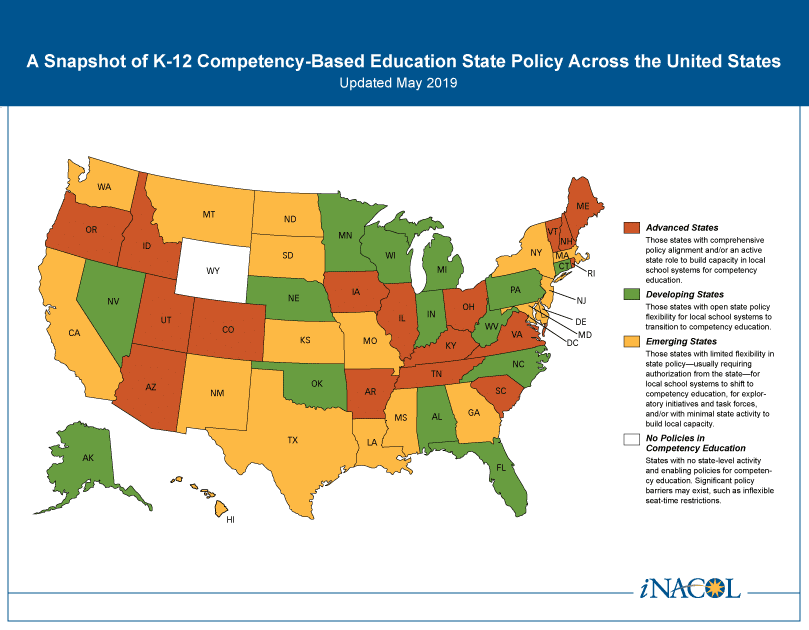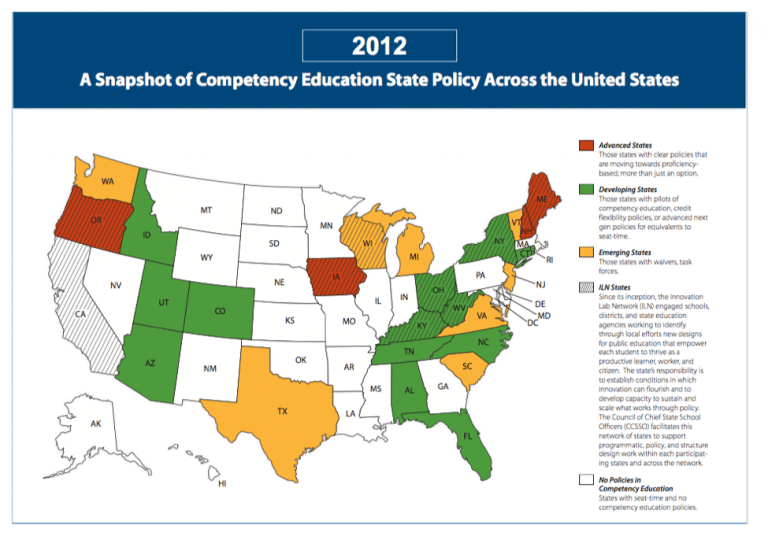iNACOL Releases Updates to the Snapshot of K-12 Competency Education State Policy Across the United States
Education Domain Blog
Today, iNACOL released the updated CompetencyWorks map for 2019, a snapshot of K-12 competency education state policy across the United States. The map was last updated in September 2018.
You can download a copy of the map here.
 We have categorized the states as “Advanced,” “Developing,” “Emerging,” and “Not Yet” on the map to signify whether the state has permissive, enabling, or comprehensive state policy to advance competency-based education.
We have categorized the states as “Advanced,” “Developing,” “Emerging,” and “Not Yet” on the map to signify whether the state has permissive, enabling, or comprehensive state policy to advance competency-based education.
“Advanced” means that the state has comprehensive policy alignment or has established an active state role to build educator capacity in local school systems for competency education.
“Developing” means that the state has open state policy flexibility for school districts to transition to competency education.
“Emerging” means that there is limited state policy flexibility and, usually, the state requires authorization for school systems to shift to competency-based education.
In the updated map, there are 17 “Advanced” states (in red), 14 “Developing” states, plus the District of Columbia ( in green), and 18 “Emerging” states (in yellow.)
Additionally, the 2019 map removes the shading that formerly designated whether a state was a part of the Council of Chief State School Officers’ Innovative Lab Network (ILN), which is phasing out this year.
Updates to State Categorization
This month, two states have moved up one category on the map, in recognition of new developments in state policy or leadership that create more conducive conditions for competency education.
California: Moved from “Not Yet” to “Emerging”
California has been considered as “Not Yet” since we began publishing the map in 2012. Despite many examples of innovative practice happening in individual districts and schools across the state, California did not have any policies, regulations, or clear leadership in place to encourage competency-based education statewide. Recently, there have been numerous developments at the state level that signal support for innovative learning models.
As part of its Every Student Succeeds Act (ESSA) state plan, California has implemented a multiple measures accountability and reporting dashboard, the California School Dashboard. The dashboard is notable in that it includes locally defined measures to enable communities to hold themselves accountable for the outcomes that matter most. It also eschews a single, summative rating of school performance to spark more nuanced conversations about school quality and student success. Additionally, California state staff are participating in the Center for Innovation in Education’s State-Level Performance Assessment Learning Community. Because California meets the criteria of “minimal state activity to build local capacity” through its leadership and engagement in next generation accountability designs and performance assessment, we have moved it into the “Emerging” category.
Michigan: Moved from “Emerging” to “Developing”
In recent years, Michigan has created a competency-based education pilot and has connected its competency-based education work to system-wide initiatives (such as work-based learning and talent pipeline). Additionally, competency-based education is among Michigan’s Top 10 in 10 strategic plan initiative. Along with researchers from Michigan State University, the state announced a research partnership to study competency-based education and evaluate the implementation of the pilot. Furthermore, the Michigan Department of Education has identified competency-based education as part of its strategic research agenda, with the priority question: “How can personalized learning approaches and competency-based education help with student outcomes – academic as well as other outcomes of interest?” More information on Michigan’s statewide plans to invest in competency-based education can be found at the Michigan Department of Education website.
Only one state, Wyoming, shows little or no state-level policy activity for competency education. This could signify that there may be significant policy barriers existing in the state, such as inflexible seat-time restrictions.
Continuing a Nationwide Trend Toward Supporting Competency Education
Since 2012, CompetencyWorks has released an annual snapshot map of the United States, categorizing states into levels at which their policy environments and state activities support competency-based education.
Seven years ago, far fewer states had policies to support competency-based education. As can be seen from the 2012 map below, nearly half of all states were designated as having no policies to support competency-based education. Today, all but one state have taken steps to create space for or to support next generation learning models.

There is a significant trend of states creating policies to support competency-based learning across the country. Most of the work to create personalized, competency-based learning environments takes place within local school systems. However, when there is synchronization between policy and practice and when there is collaboration and partnership between policymakers and local school leaders, widespread transformation can take place. Students can access educational opportunities that will enable them to succeed in higher education, in the workplace and in life.
Learn more:
- iNACOL ‒ A National Landscape Scan of Personalized Learning in K-12 Education in the United States
- iNACOL ‒ Current to Future State: Issues and Action Steps for State Policy to Support Personalized, Competency-Based Learning
- CompetencyWorks ‒ Fit for Purpose: Taking the Long View on Systems Change and Policy to Support Competency Education
- iNACOL Issue Briefs
- State Policy & K-12 Competency-Based Education
- Redefining Student Success: Profile of a Graduate
- Redesigning Systems of Assessments for Student-Centered Learning
- Rethinking State Accountability to Support Personalized, Competency-Based Learning in K-12 Education
- State Strategies to Develop Teacher Capacity for Personalized, Competency-Based Learning
Natalie Truong is Policy Director of iNACOL.